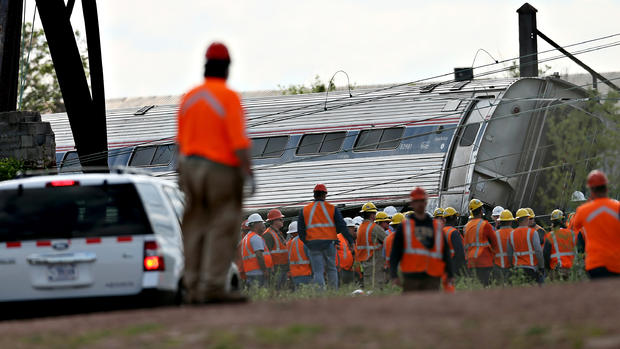Prosecutors weigh charges against engineer in deadly Amtrak crash
PHILADELPHIA -- The Amtrak engineer at the controls of a train that derailed in Philadelphia, killing eight people, remains the focus of an inquiry by federal transportation safety investigators. But a second probe could prove more personally devastating: Prosecutors are trying to determine if he committed a crime.
Brandon Bostian could face criminal charges if law enforcement finds he was reckless or negligent when the train approached a curve at 106 mph, former prosecutors said. But any prosecution would have to pass a high bar.
Federal investigators said Wednesday that Bostian used his cellphone the day of the crash, but his lawyer has said it was stowed away and turned off during the ill-fated trip to New York. The lawyer said Bostian then retrieved it from the twisted wreckage and used it to call 911.
Bostian had only been working on the Northeast Corridor for fewer than three weeks. An NTSB spokesman told CBS News says "it was two weeks, give or take a few days."
Lawyers suggest the charges under review would include reckless endangerment, involuntary manslaughter, third-degree murder and aggravated assault, especially if he were on his phone or intentionally distracted.
Jurors, though, must find significant negligence to convict someone of those crimes.
"Even for involuntary manslaughter, it's not just a mistake that caused death, it's negligence that caused death - something not reasonable for the situation," said veteran criminal defense lawyer Jack McMahon, a former Philadelphia prosecutor. "If it were truly an accident - if he tripped - then that wouldn't even be a crime."
Philadelphia District Attorney Seth Williams expects to wait until the National Transportation Safety Board issues its findings before deciding on charges. U.S. Attorney Zane Memeger also is keeping tabs on the probe.
Bostian's lawyer, Robert Goggin, has not responded to repeated requests for comment from The Associated Press. He told ABC that his client suffered a concussion and has no memory of the moments leading up to the May 12 derailment, which killed a U.S. Naval Academy midshipman, an Italian wine broker and six other people and injured dozens.
That could cut both ways at trial.
"Sometimes not remembering what took place is a good defense, but sometimes that boxes you in, permits everybody else to get their story in, but you can't counter it because you can't remember," said former federal prosecutor Robert Goldman, of suburban Philadelphia.
Engineers have been charged following other deadly train wrecks.
In Canada, a rail engineer who is accused of failing to secure the brakes on an oil train was charged with 47 counts of criminal negligence for the ensuing derailment and explosion that killed 47 people. His case remains pending.
A Conrail engineer was sentenced to five years in prison on state manslaughter charges for crashing into an Amtrak train near Chase, Maryland, in 1987, killing 16 people and injuring 175 more. Rick L. Gates was sentenced to an additional three years in federal prison for lying about performing safety checks and smoking marijuana with his brakeman before the crash.
Last week, however, New York City prosecutors decided not to charge a commuter rail engineer who fell asleep as his Metro-North Railroad train took a curve at 82 mph in 2013. William Rockefeller was later found to have sleep apnea. His lawyer argued that the rail line had failed to maintain its equipment or screen employees for medical problems before the fatal crash.
If charges were filed against Bostian, who lives in New York, a jury would have to decide whether his actions meet the standard for criminal negligence.
"Absent a failure of the train, what will his explanation be, if any, as to why the train sped off going 106 mph in the curve?" asked defense lawyer Frank DeSimone.
DeSimone represented a tugboat operator convicted for using a cellphone while at the helm of his vessel in Philadelphia, causing a 2010 crash that killed two foreign students on a duck boat.
First mate Matthew Devlin spent about a year in prison after pleading guilty to deadly misconduct by a ship operator, a maritime law triggered by even simple negligence - a lesser standard than the gross negligence likely to apply in the Amtrak case. Devlin was calling his wife because of a medical crisis involving their young son.
The Amtrak survivors who have filed civil lawsuits include a retired health care administrator from Spain who he said nearly lost an arm and a Brooklyn advertising executive who suffered broken ribs, lost teeth and torn ligaments.
"When a train derails on a speed-limited curve, there is one inescapable conclusion: The train was speeding," said their lawyer, Robert Mongeluzzi, who also represented the families of the duck boat victims. "We look forward to deposing the memory-impaired engineer as to what he remembers happening."
Amtrak resumed full service Monday for the first time since the crash.
"Crossing over the newly replaced tracks, the train slowed noticeably as we went around the curve where the derailment happened," CBS News correspondent Kris Van Cleave reported from on board the first train between Philadelphia to New York City early Monday morning.
Passenger Bryan Cummings told CBS News he had no hesitation about taking Amtrak.
"It's one of the safest ways to travel, and you know, just living in fear of another accident isn't the way I want to go about traveling," Cummings said.
